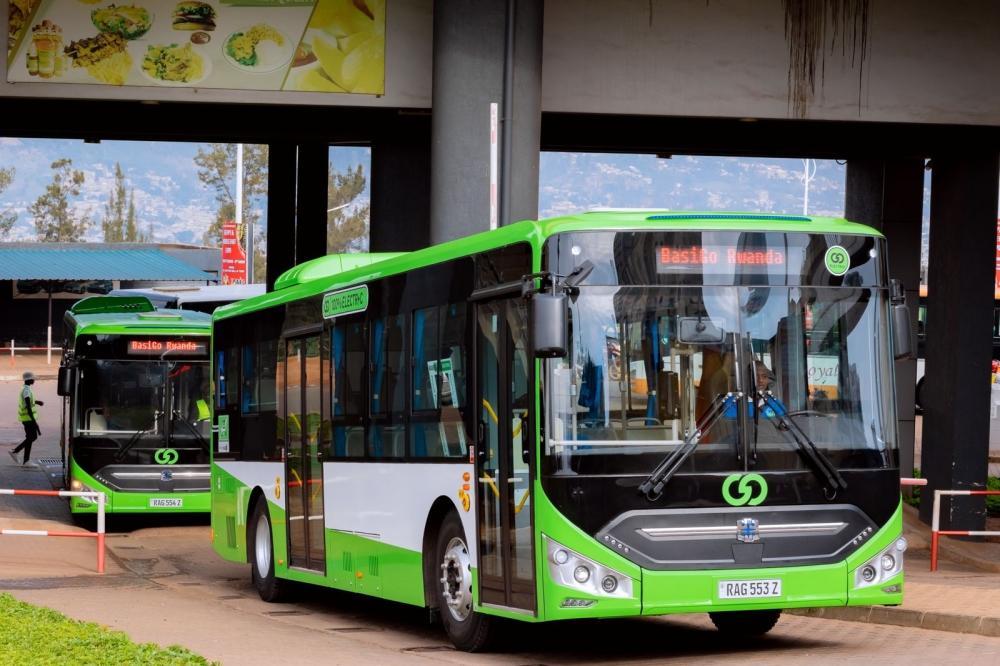Africa-Press – Rwanda. Public transport operators are calling for flexibility and clear implementation guidelines amid City of Kigali’s decision to ban the entry of new diesel-powered public buses in favour of electric ones.
Announced in June, the move is in line with Rwanda’s plan to embrace e-mobility. However, city officials have not yet specified when – the date and month – the ban will take effect.
“From this year, no bus will enter Kigali unless it is electric,” said Kigali Mayor Samuel Dusengiyumva during the City of Kigali General Assembly on June 24.
Dusengiyumva cited cost efficiency, noting that while a diesel bus may consume Rwf180,000 worth of fuel per day, an electric bus uses only Rwf40,000 in electricity.
By the time of publication of this article, the City of Kigali had not yet responded to The New Times’ request for information about the timeline.
Transporters told The New Times they support the shift to electric vehicles but are concerned about the lack of details, and financial implications arising from the situation.
Cost, clarity, and financial burden
Nilla Muneza, Director General of Royal Express, said transport firms are still waiting for information on the policy’s implementation, such as specific requirements and timelines.
Royal Express operates about 70 buses, over 90 per cent of which are diesel-powered. Each has a transport capacity of 70 passengers. Replacing these with electric buses would require a significant investment, as one costs around Rwf280 million, he indicated.
“This business needs to be sustainable. You cannot invest in a venture when you’re uncertain about how long you’ll operate before being told to stop,” said Muneza.
He suggested that the financial capacity of operators be considered when enforcing the transition.
Electric vs diesel: long-term benefits, short-term strain
Muneza pointed out that the cost of operating an electric bus is about 70 per cent lower than diesel – in terms of energy expenses. However, the upfront cost is higher — nearly 1.5 times that of a diesel-powered bus.
With the same investment, you can get almost two electric buses instead of three diesel ones, he said.
He called for a more stable public transport policy to enable long-term planning and profitability, especially as the sector offers low immediate returns.
Decision implementation should not harm transport business
Charles Ngarambe, Chairman of Kigali Bus Services (KBS), expressed the need for careful phasing out of diesel buses to avoid financial losses. KBS operates 40 diesel buses and nine electric ones, he indicated.
Ngarambe noted that many buses were bought using loans that must be repaid.
“We hope to engage with authorities to find a mutually beneficial approach that won’t harm operators economically,” he said.
Although electric buses have lower operating costs, transport companies argued that unclear regulations and the emergence of government-backed Ecofleet Solutions — a public firm, which among others, manages 200 relatively diesel-powered buses which were bought less than two years ago — has made private operators hesitant to invest further.
They wondered whether they are going to work with Ecofleet as partners or competitors.
According to Rwanda’s Revised Green Growth and Climate Resilience Strategy (September 2022), the country plans to scale up investments in e-mobility, including electric buses and motorcycles, in both Kigali and secondary cities.
The total investment needed for e-mobility transition by 2050 is estimated at over $1 billion (approx. Rwf1.4 trillion based on current exchange rates).
This includes the rollout of Bus Rapid Transit (BRT) systems and wider adoption of electric vehicles through public-private partnerships.
For More News And Analysis About Rwanda Follow Africa-Press






